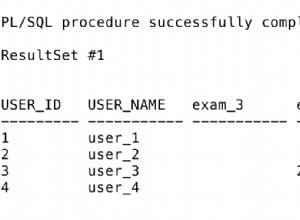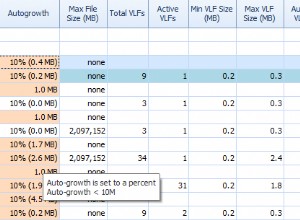Non ci sono semplici soluzioni basate su plpgsql. Alcune possibili soluzioni:
- Utilizzo di
hstoreestensione.
CREATE TYPE footype AS (a int, b int, c int);
postgres=# select row(10,20,30);
row
------------
(10,20,30)
(1 row)
postgres=# select row(10,20,30)::footype #= 'b=>100';
?column?
-------------
(10,100,30)
(1 row)
hstore la funzione basata può essere molto semplice:
create or replace function update_fields(r anyelement,
variadic changes text[])
returns anyelement as $$
select $1 #= hstore($2);
$$ language sql;
postgres=# select *
from update_fields(row(10,20,30)::footype,
'b', '1000', 'c', '800');
a | b | c
----+------+-----
10 | 1000 | 800
(1 row)
- Alcuni anni fa ho scritto un'estensione pl toolbox
. C'è una funzione
record_set_fields:
pavel=# select * from pst.record_expand(pst.record_set_fields(row(10,20),'f1',33)); name | value | typ ------+-------+--------- f1 | 33 | integer f2 | 20 | integer (2 rows)
Probabilmente puoi trovare alcune soluzioni solo plpgsql basate su alcuni trucchi con tabelle e array di sistema come questo
, ma non posso suggerirlo. È troppo meno leggibile e per utenti non esperti solo magia nera. hstore è semplice e quasi ovunque, quindi dovrebbe essere il modo preferito.
Su PostgreSQL 9.4 (forse 9.3) puoi provare la magia nera con manipolazioni JSON:
postgres=# select json_populate_record(NULL::footype, jo)
from (select json_object(array_agg(key),
array_agg(case key when 'b'
then 1000::text
else value
end)) jo
from json_each_text(row_to_json(row(10,20,30)::footype))) x;
json_populate_record
----------------------
(10,1000,30)
(1 row)
Quindi sono in grado di scrivere la funzione:
CREATE OR REPLACE FUNCTION public.update_field(r anyelement,
fn text, val text,
OUT result anyelement)
RETURNS anyelement
LANGUAGE plpgsql
AS $function$
declare jo json;
begin
jo := (select json_object(array_agg(key),
array_agg(case key when 'b' then val
else value end))
from json_each_text(row_to_json(r)));
result := json_populate_record(r, jo);
end;
$function$
postgres=# select * from update_field(row(10,20,30)::footype, 'b', '1000');
a | b | c
----+------+----
10 | 1000 | 30
(1 row)
La funzione basata su JSON non dovrebbe essere terribilmente veloce. hstore dovrebbe essere più veloce.




